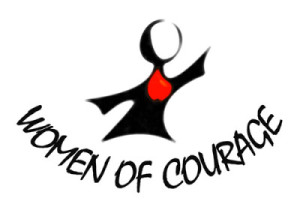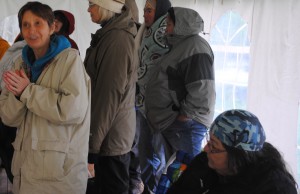Reflecting on the Wabanaki Convergence Ceremony

By Coordinator and Elder Alma H. Brooks
KAIROS Atlantic and national are honoured to work with Elder Alma Brooks of St Mary’s First Nation. Representatives from the region and the national office were present at a recent sacred ceremony that incorporated the moment of high tide during the May 2013 full moon. Here Alma reflects on these rich and important days of prayer and action in defense of water. For more background on Alma’s work, see this story from the Halifax Media Co-op. For more on the Ceremony, see Rachel Warden’s reflection.
In March of 2013, in light of the attempted assault and potential danger to the earth and water within the Wabanaki Traditional Territory, Penobscot Elders stated that there needs to be a convergence ceremony to help protect the lands and fresh water. [They said] the ceremony must be held for three years in a row in different significant places, sacred to our Ancestors.
EkwPahak is one such place. The Wolastoq, (the beautiful river) is the main artery in the traditional homeland of the Wolastoqiyik, ( the people of the beautiful river) and it has many tributaries within its watershed. All of the water that runs into the Wolastoq has come from each of the tributaries, and has touched every inch of land in Wolastoqiyik territory. All of the water continuously runs out to sea, then turns and comes back up the Wolastoq, as far as EkwPahak, which means in our language “the end of the tide.”
[As the planners prepared] weather channels started forecasting heavy rain warnings all week. On May 23 Elizabeth Blaney and I went to inspect and smudge the grounds at EkwPahak to pick out the best camping space and decide where the sacred fire would be placed. Dr. Bill Cook and his partner Wendy Carty, who own the Iris Centre ( a place where they offer yoga, meditation exercises, mindfulness training, and other energy work ) walked with us and told us about the beavers who were damming up the wet land area which they were very proud of. They asked us to remember the beavers in our prayers that weekend as they were at risk of being evacuated and possibly killed.

Alma Brooks (right) and Elizabeth Blaney at the Wabanaki Convergence Ceremony. (Photo: Rachel Warden/ KAIROS)
The property looked just fine and the fire would be down close to the river’s edge with lots of room for camping. Ash and butternut trees grew in abundance here as well as river grapes and other food and medicine sources once used by our ancestors. The firewood was brought in.
Friday at dawn the rain started at a pretty good clip. We decided to go and set up camp at noon as 3:45AM comes early. By 12:00 o’clock everything was loaded into the van and ready to go. Strangely the rain stopped while we were setting up our tents and Gazebos; and started up again immediately afterwards. (So obvious, it was funny.)
The toilets arrived early and proceeded to come down the trail behind us. Needless to say with the heavy rain and such a heavy truck they got mired in the mud, blocking the only road in or out of the camping area. So everything else had to be taken in by foot, backpack, wagon or wheelbarrow. Late comers were not happy campers. But the ceremony must go on.
The rain continued heavily all night, but even with the clouds the night appeared bright. Around 3:00AM I heard the rain subside. I got out of my warm sleeping bag and got dressed for the weather, wondering if the men had lit the fire yet. The women came one by one, gathering round the sacred fire pit waiting for the men to arrive.
They came and had the fire lit by 3:45AM in time for the full moon ceremony and the full lunar eclipse, which took 1 hour. Guess what? The rain had stopped. We were busy getting our bundles and tobacco ties ready. People were still arriving (those who didn’t want to camp over made their way in the dark of night to find the fire ). More and more people came, until there was a large circle around the fire. Once the fire was lit the fasting from food and water began. (Some people asked me to be allowed coffee, rationalizing that in other places fasting had been compromised in this way – they were told to make their own decision on that matter.)
The women gathered close to the sacred fire with their prayers wrapped up in tiny bundles made from yellow cloth and tobacco; and each presented their prayers to the creator of their own understanding. A special water song was offered and the “gift of life”, water, was shared around to all present including to the earth and to the river. Many thanks were expressed for all the things the earth has provided to us over the generations. This was a time for giving back in gratitude and appreciation.
Immediately after the women’s ceremony Elder Ron Tremblay conducted the sunrise ceremony which was about 4:45am. Just as he started calling on our ancestors to come to the fire, everyone heard a loud slap on the water behind him, then another and still another. Everything stopped. The people began to whisper to one another “ that sounds like beaver” – “what are they doing on the side of the riverbank”; and “they have come so close.” It was almost as though they were reminding us of our promise to pray for them too: “ don’t forget about us” It sure was a highlight of the ceremony for me. One of the men present has a spirit name, “kwapit.”(“Beaver” in the Maliseet language)
As soon as the morning ceremonies were concluded the rain poured down and everyone rushed to some shelter or another. People re-grouped again around 10:00am for a pipe ceremony under a large arbor near the Iris Centre. It is estimated around 75 people participated over all, with large aboriginal delegations from the Penobscot, Tobique, and St. Mary’s.
After the pipe ceremony finished there was a meditation session facilitated by Wendy Carty followed by a talking circle. This event took the rest of the afternoon, speaking about their experience and commenting about the rain, which no one seemed to mind at all. “After all, it is a water ceremony.” The Penobscot delegation traveled a long way, and will be hosting the convergence ceremony next year (2014) in a place near Mount Katadin.
All in all the Wabanaki Convergence Ceremony was a success considering the severe weather throughout the entire weekend. This was a test for those who are sincere, and those simply wearing a mask. The beaver were happy to attend for sure, or maybe they were telling us to get away from their turf. The place, time and date for the next ‘convergence’ will be posted on the Maliseet Grand Council face book page right after the New Year.








